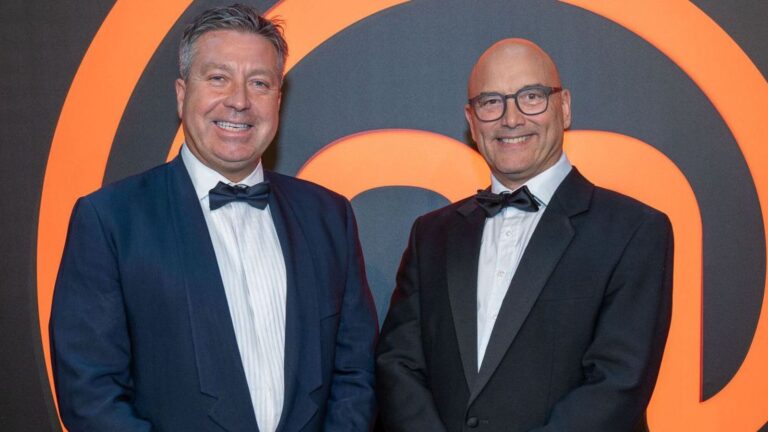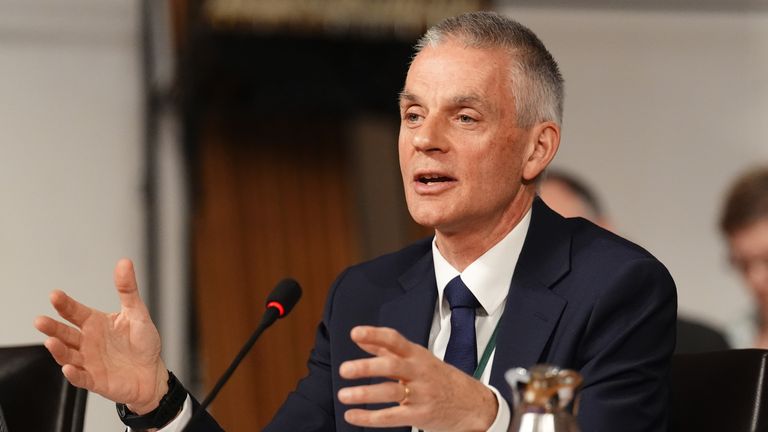BBC director-general Tim Davie has said MasterChef can survive its current scandal as it is “much bigger than individuals” – but the corporation must “make sure we’re in the right place in terms of the culture of the show”.
He praised the popular cooking contest, which has been beset by scandal in recent months, as “a great programme that’s loved by audiences.” The production’s current deal with the corporation runs out in 2028.
Speaking as the BBC unveiled its annual report, and following a recent series of high-profile missteps, Mr Davies said the corporation’s leadership team will not “tolerate behaviour that is not in line with our values,” confirming “the senior individuals and people involved in these cases are being held to account”.
On Monday, it was revealed an independent review into “inappropriate behaviour” by MasterChef presenter Gregg Wallace had upheld more than half of the allegations against him.
A few hours later, Wallace’s former MasterChef co-presenter, John Torode, said an allegation he used “racial language” was upheld in the report as part of a review.
After the report was published, Wallace, 60, said he was “deeply sorry” for causing any distress, and never set out to “harm or humiliate”.
Torode, 59, said he had “no recollection of the incident” and said he “did not believe that it happened,” and said he was “shocked and saddened by the allegation”.
Mr Davie said the BBC’s leadership team would not “tolerate behaviour that is not in line with our values,” while BBC chair Samir Shah acknowledged there were still pockets within the broadcaster where “powerful individuals” can still “make life for their colleagues unbearable”.
They said several BBC staff members had been dismissed in the last three months, following an independent review into workplace culture, which found that while the corporation did not have a toxic culture, there was a minority of people who behaved unacceptably and whose behaviour was not addressed.
Wallace, who was sacked from MasterChef last week, is not included in that count as he was not directly contracted by the corporation, but was employed by independent production company Banijay.
The corporation has yet to decide if the unseen MasterChef series – filmed with both Wallace and Torode last year – will be aired or not.
News of the findings in the Gregg Wallace report came just hours before the BBC was deemed to have breached its editorial guidelines by failing to disclose that the child narrator of a Gaza documentary was the son of a Hamas official.
Media watchdog Ofcom subsequently launched its own investigation into Gaza: How To Survive A Warzone, which was removed from BBC iPlayer in February.
While the 2024-25 annual report showed a small rise in trust overall for the corporation, Mr Davie acknowledged it had been a year which saw the reputation of the BBC damaged by “serious failings” in the making of the documentary.
The BBC boss acknowledged: “It was important that the BBC took full responsibility for those failings and apologised for them,” and later in response to a question, called the documentary “the most challenging editorial issue I’ve had to deal with”.
He said the BBC were “taking action to ensure proper accountability and we’re taking immediate steps to stop a failing like this being repeated”.
Mr Davie added: “The importance of fair balance reporting, the need for high-quality homegrown programming in the face of massive pressure, I think has never, ever been greater. And I believe my leadership and the team I’ve assembled can really help the BBC thrive in that environment and very competitive environment.”
BBC boss role not compatible with a ‘stress-free existence’
Despite a series of failings in recent months – including livestreaming the controversial Bob Vylan set at Glastonbury last month – Mr Davie insisted he can “lead” the organisation in the right direction.
When asked if he would resign, he replied: “I simply think I’m in a place where I can work to improve dramatically the BBC and lead it in the right way.
“We will make mistakes, but I think as a leadership and myself, I’ve been very clear, and I think we have been decisive.”
He said the organisation was setting a “global standard” for media.
In a nod to what he called a “tough period,” he said the job of director general wasn’t one you took on “if you want a quiet life or a stress-free existence”.
Mr Shah, reiterated his support for Mr Davie.
“Tim Davie and his team, and Tim in particular, has shown very strong leadership throughout all this period and he has my full support.”
The report showed that Mr Davie, who has been in the role since 2020, has had a 3.8% pay rise with his salary going up £20,000 from £527,000 last year to £547,000.
Rich list stars and a trusty blue Heeler dog
Meanwhile, in other salary news, the report also revealed its on-screen top earners, which saw former Match Of The Day host Gary Lineker top the chart for the eighth, and final, time.
Lineker left the BBC early at the end of the last Premier League season in May and was reported to have earned £1.35 million, according to the corporation’s annual report.
Radio presenter Zoe Ball was the second highest paid, earning £517,000 for her work on the Radio 2 Breakfast Show, which she also left in December last year. She’s since returned to a new Saturday afternoon show, which she began hosting in May 2025.
Meanwhile, Australian children’s cartoon Bluey proved a boon for the broadcaster, and was the most watched show in the US across all genres, with a whopping 55 billion minutes viewed.
Last year’s BBC annual review was overshadowed by controversy over flagship show Strictly Come Dancing, while the year before saw disgraced newsreader Huw Edwards named the corporation’s highest-paid news anchor, despite having been suspended for nine months.






